In early March, my newly planted peppers began wilting overnight. After doing some research, it sounded like they were suffering from too much water. The plants were relatively young, and the rain in south Florida would not let up. My solution was to construct a box with much better drainage. I replaced the peppers and tried again.
Now, two months later, I am faced with the same thing. These are mature plants with peppers half grown. The stems of my peppers began to turn brown and the leaves wilted overnight. There was nothing I could do but remove the dying plants.
Professional Help Needed
More research turned up another possibility… a fungus. At this point, I decided that I did not know enough about this. It was time to have a professional look at my issue..
I took the 8th wilted pepper plant (of the 12 peppers I planted) to the Mounts Botanical Garden for examination. Mounts has had a Master Gardener Program with a help desk since 1979. I have taken problems to them over the years. They are a great bunch of people… friendly, helpful and extremely knowledgeable.
After filling out a form with my contact information and a little about my garden and my problem, I left the plant. I was told my wilted plant would be shown to a professional the following day. Mounts help desk volunteer, Dr. Kenneth Pernezny, who worked in agriculture with vegetable growers in the Glades, took a look at my pepper plant and come up with a diagnosis. This morning I received a call from Ken at Mounts with the bad news.
Phytophthora Is Terminal and Untreatable
The first thing Ken said was that my garden is infected with the absolute worst thing a home gardener can run into. My peppers are infected with Phytophthora. It is a soil-borne, anaerobic fungus that is unrelenting and terminal. There is no treatment available to home gardeners.
About the only bright spot here is that it is nothing I did. Phytophthora is naturally occurring in the soil. The weather conditions in south Florida this past winter… the continual hard rains, during what is usually our dry season combined with warmer than usual temperatures… caused this fungus to flourish.
I was on the right track earlier in the season when I constructed another box with better drainage. Unfortunately, the weather did not let up, so the fix wasn’t enough to save the peppers.
Vegetables that Are Susceptible
I plant what I like to eat… tomatoes, squash, cantaloupe, peppers, okra, green beans, and herbs this season. Unfortunately, most of what I planted is susceptible to this disease. Peppers and eggplant are at the top of a list that includes tomatoes, squashes, melons, and other vegetables. I was told that even green beans can be affected, although, mine seem to be okay for now.
Ken said that grass-type plants such as corn and rice are not affected by this disease. He recommended planting these types of vegetables for a couple of years as alternatives.
What to Do Now
The growing season where I live in south Florida is just about over. Previously, toward the end of June or beginning of July, I would pull up what was left in the boxes, turn the dirt and cover the soil with a sheet of black plastic. The sun and plastic combination ‘bakes’ the soil in the boxes for several months until I’m ready to plant again in October. After talking with Ken, I found that I will need a new ritual this year.
Sterilize and Start Over
Phytophthora does not go away on its own. The contaminated soil has to be removed, and my containers will have to be sterilized before they are refilled. There is no way to treat the contaminated soil.
I asked Ken about disposing of the infected soil. Obviously, there is no way I can cart away as much soil as I have in two 2 x 4 x 8-ft boxes and one 2 x 2 x 4-ft box. I asked him about spreading the soil in my yard.
Ken approved that as a good option because grasses are not affected by Phytophthora. Ken did not know about how the ornamentals in my yard would be affected as he is a vegetable guy, but I have enough yard to spread the contaminated soil away from other plants. I have fruit trees and flowers all over my yard.
Sterilization Process
Once all the soil and weed barrier cloth are removed, the containers will have to be sterilized before new soil is added. The recommendation is to wash the completely empty boxes with a bleach solution. I plan to do so, as soon as the growing season is over and the remaining plants are finished producing in mid June or early July.
Start Up Next Season
I will remove the dirt from the containers, and I plan to leave them empty and exposed to the sun until October. Around October 15th, I will repeat the bleach and water wash, then reline the boxes with new weed barrier cloth and fill them with new soil from my usual nursery. I will ask a most important question at that time… “Has the soil you are selling been sterilized?” If not, I will be shopping around.
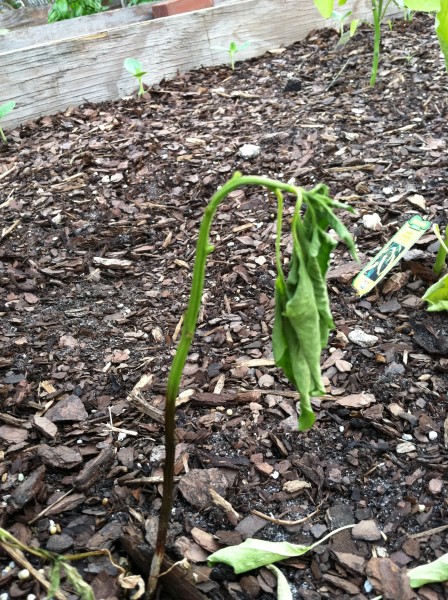
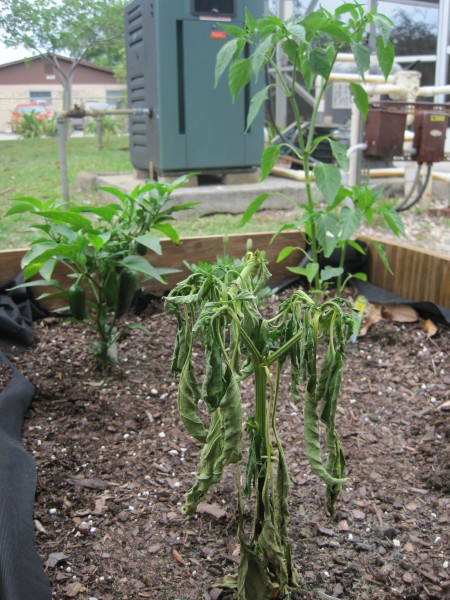
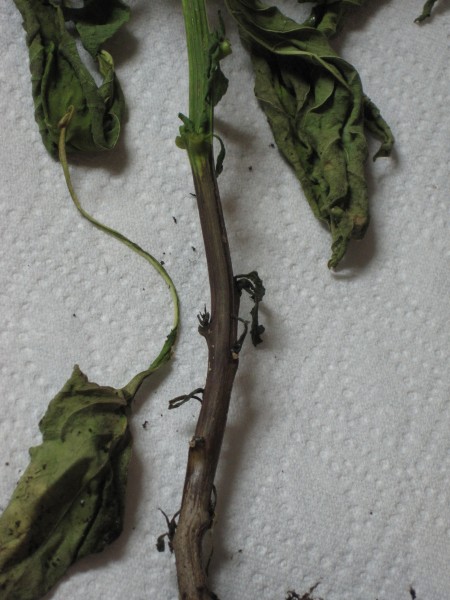
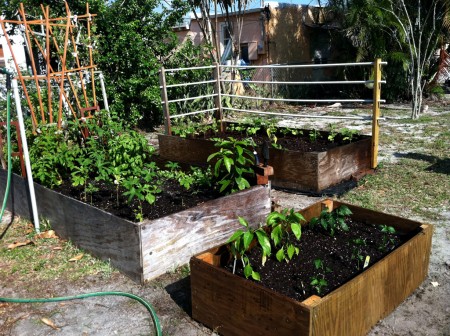
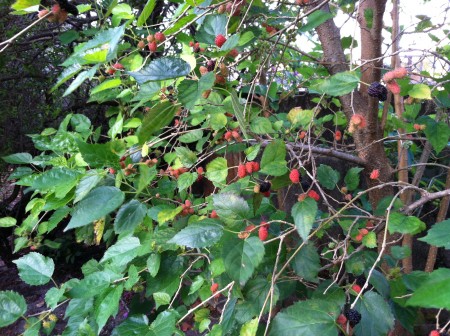
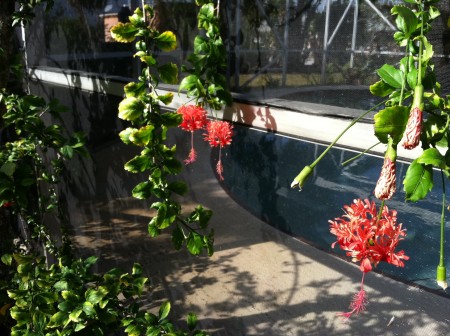
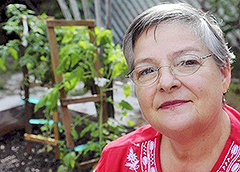
If there was a sympathy card for gardeners I certainly would be sending it to you Lila. So sad…..and glad you directed your energies to the Master Gardener after your own experienced diagnosis. Good luck on your next effort. Meanwhile, how about buying from local farm markets?
Gail,
This story has evolved with a few more surprises. Hold on to the sympathy card for a couple more days. Wait until you see…
When I can’t grow my own, I do patronize local farm markets. There are two within a mile of my home. Also, I love the local green markets. We have them all up and down the coast. Fresh veggies, good food, nice music, fresh air and sunshine… so good!
Lila, what’s the water pH ….?
Richard,
I did not check the pH of the rain water. At the time this was happening, I was not watering my garden at all. We were having heavy rains everyday. The rains were coming during South Florida’s dry season… very unusual.